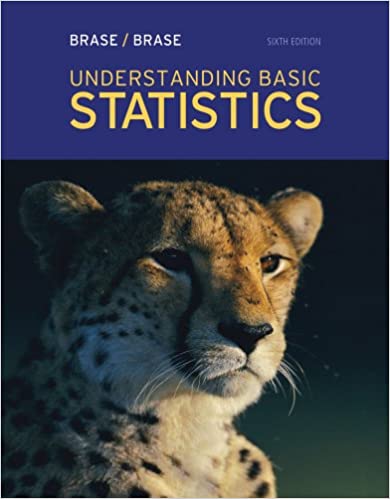
Understanding Basic Statistics 6th Edition by Charles Henry Brase,Corrinne Pellillo Brase
Edition 6ISBN: 978-1111827021
Understanding Basic Statistics 6th Edition by Charles Henry Brase,Corrinne Pellillo Brase
Edition 6ISBN: 978-1111827021 Exercise 24
For each hypothesis test in Problems 3-10, please provide the following information:
(i) What is the level of significance State the null and alternate hypotheses.
(ii) Check Requirements What sampling distribution will you use What asumptions are you making What is the value of the sample test statistic
(iii) Find (or estimate) the P -value. Sketch the sampling distribution and show the area corresponding to the P -value.
(iv) Based on your answers in parts (i) - (iii), will you reject or fail to reject the null hypothesis Are the data statistically significant at level
(v) Interpret your conclusion in the context of the application.
Note: For degrees of freedom d.f. not in the Student's t table, use the closest d.f. that is smaller. In some cases, this choice will increase the P -value by a small amount or increase the length of a confidence interval, thereby making the answer slightly more "conservative." Answers may vary due to rounding.
Wildlife: Wolves A random sample of 17 wolf litters in Ontario, Canada, gave an average of
 wolf pups per litter with estimated sample standard deviation s 1 = 1.0. Another random sample of 6 wolf litters in Finland gave an average of
wolf pups per litter with estimated sample standard deviation s 1 = 1.0. Another random sample of 6 wolf litters in Finland gave an average of
 wolf pups per litter with sample standard deviation s 2 = 1.2 (see source for Problem 5).
wolf pups per litter with sample standard deviation s 2 = 1.2 (see source for Problem 5).
(a) Find an 85% confidence interval for 1 2 , the difference in population mean litter size between Ontario and Finland.
(b) Examine the confidence interval and explain what it means in the context of this problem. Does the interval consist of numbers that are all positive all negative of different signs At the 85% level of confidence, does it appear that the average litter size of wolf pups in Ontario is greater than the average litter size in Finland
(c) Test the claim that the average litter size of wolf pups in Ontario is greater than the average litter size of wolf pups in Finland. Use = 0.01.
(i) What is the level of significance State the null and alternate hypotheses.
(ii) Check Requirements What sampling distribution will you use What asumptions are you making What is the value of the sample test statistic
(iii) Find (or estimate) the P -value. Sketch the sampling distribution and show the area corresponding to the P -value.
(iv) Based on your answers in parts (i) - (iii), will you reject or fail to reject the null hypothesis Are the data statistically significant at level
(v) Interpret your conclusion in the context of the application.
Note: For degrees of freedom d.f. not in the Student's t table, use the closest d.f. that is smaller. In some cases, this choice will increase the P -value by a small amount or increase the length of a confidence interval, thereby making the answer slightly more "conservative." Answers may vary due to rounding.
Wildlife: Wolves A random sample of 17 wolf litters in Ontario, Canada, gave an average of
 wolf pups per litter with estimated sample standard deviation s 1 = 1.0. Another random sample of 6 wolf litters in Finland gave an average of
wolf pups per litter with estimated sample standard deviation s 1 = 1.0. Another random sample of 6 wolf litters in Finland gave an average of  wolf pups per litter with sample standard deviation s 2 = 1.2 (see source for Problem 5).
wolf pups per litter with sample standard deviation s 2 = 1.2 (see source for Problem 5).(a) Find an 85% confidence interval for 1 2 , the difference in population mean litter size between Ontario and Finland.
(b) Examine the confidence interval and explain what it means in the context of this problem. Does the interval consist of numbers that are all positive all negative of different signs At the 85% level of confidence, does it appear that the average litter size of wolf pups in Ontario is greater than the average litter size in Finland
(c) Test the claim that the average litter size of wolf pups in Ontario is greater than the average litter size of wolf pups in Finland. Use = 0.01.
Explanation
(a)
Let
and
represent the populati...
Understanding Basic Statistics 6th Edition by Charles Henry Brase,Corrinne Pellillo Brase
Why don’t you like this exercise?
Other Minimum 8 character and maximum 255 character
Character 255


